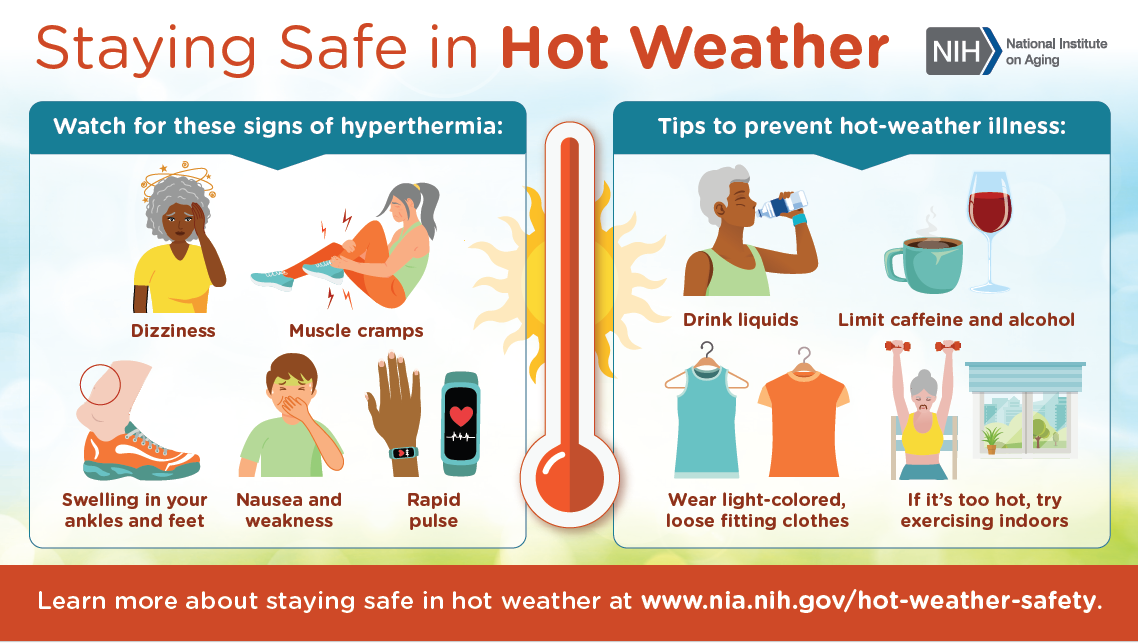Summer is in full swing in the Northern Hemisphere. Weather extremes are increasing, with hotter temps a concern for large swathes of the U.S. At the same time, the U.S. population is older than ever before and there are safety measures to keep in mind when we venture outdoors. It’s important to take precautions when taking aging adults out into the sun and heat.
Tips for Keeping Older Adults Safe in the Heat of Summer
by Elyse Weber-Sacks, MSW, LSW, CMC – Aging Life Care Professional®, ALCA Board Member
Older adults, and those with heart, lung, or kidney diseases, are more vulnerable to heat stroke. These seven safety tips will help you and your aging loved one beat the heat and stay healthy this summer:
Wear Sunscreen.
Whether you’re heading outside for half-hour or the whole day, proper sunscreen use is essential for skin health and blocking the sun’s rays. Use sunscreen with no less than 30 SPF and that protects from both UVA and UVB rays. And don’t forget the importance of reapplying every 80 minutes.
Wear sunglasses.
Especially if you’re driving on a sunny day, glare can obstruct vision. By the pool, ocean, river, or lake? Light can reflect into your eyes off the water. It’s a good idea to keep an extra pair of sunglasses in the car or in your bag.
Drink water.
Reusable water bottles are a great investment. Not only are they environmentally friendly, but most also do a great job at keeping water cool. Don’t leave the house without a supply of water and remember to drink frequently even if you’re not feeling thirsty. Try to avoid drinking caffeine or alcohol which can be dehydrating.
Dress appropriately.
Wear layers of breathable, lightweight fabrics – you want to keep your skin covered, but not overheat. Avoid bulky and synthetic fabrics. Wear a hat. If you are in an area that gets chilly when the sun sets, bring a light sweater.
Check the forecast.
Summer storms can sneak up on us, so check the chances ahead of time and be prepared for getting caught in the rain. Consider buying a small umbrella to keep in your car or purse.
Know the signs.
Be very aware of your physical symptoms. If you start to feel dizzy, exhausted, nauseous, excessively sweaty, or get out of breath…stop! Try to find a shaded spot, indoors if possible, and sit down. Drink and, if possible, splash cool water on your face, neck, and wrists. Rest and rehydrate until you feel steady again. Seek medical attention if you do not improve or lose consciousness. Watch your loved one for symptoms of heat stroke and take immediate action if needed. Heat stroke symptoms can include: fainting or loss of consciousness, dizziness, behavioral changes (confusion, irritability), flushed skin, and weak pulse.
 Infographic – National Institute on Aging
Infographic – National Institute on Aging
Check-in on older loved ones.
Make sure they have enough to drink, aren’t exerting themselves, and have access to a comfortable environment. If they don’t have air conditioning, suggest they visit a friend who does, or that they go into a shopping center, library, or senior center to sit and cool off.
With these precautions in mind, we can all enjoy the great outdoors safely this summer!
About the author: Elyse Weber-Sacks, MSW, LSW, CMC is the president of Connie Rosenberg & Associates Care Management – celebrating 35 years seniors and the disabled. She is a licensed social worker in both New York and New Jersey. Elyse is certified as a Geriatric Care Manager by the National Academy of Certified Care Managers and is an Aging Life Care Professional®. She is a past president of the New Jersey Chapter of ALCA and was the 2016 recipient of the Outstanding Chapter member award. In January 2020, Elyse was elected to the Board of Directors of the Aging Life Care Association®.
Disclaimer: This blog is for informational purposes only and does not constitute, nor is it intended to be a substitute for, professional advice, diagnosis, or treatment. Information on this blog does not necessarily reflect official positions of the Aging Life Care Association® and is provided “as is” without warranty. Always consult with a qualified professional with any particular questions you may have regarding your or a family member’s needs.